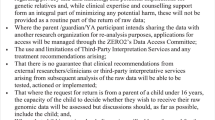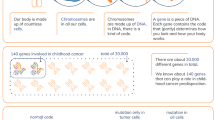Abstract
The use of stored tissue samples from children for genetic research raises specific ethical questions that are not all analogous to those raised when adult participants are concerned. These include issues with regard to consent, as it is typically a parent who consents to the use of samples from children. In this paper, we discuss the scope of parental consent. This scope has a temporal dimension and one related to the content of consent. It is not questioned that the temporal scope of parental consent is limited and that young adults have the right to decide on the fate of their samples when they reach the age of maturity. With regard to the content of consent, the question remains whether parents are allowed to give full broad consent to any possible future research on the samples of their children. We argue that they should not be allowed to do so, based on two premises. First, it is generally acknowledged that children have a right to express their own values and that they should be given the opportunity to develop their own autonomy as they grow older. Second, research and science are not completely value-free and some types of research may be more sensitive than other types. Children should be given the opportunity to express their values also in this respect.
Similar content being viewed by others
Log in or create a free account to read this content
Gain free access to this article, as well as selected content from this journal and more on nature.com
or
References
Hens K, Nys H, Cassiman JJ, Dierickx K : Biological sample collections from minors for genetic research: a systematic review of guidelines and position papers. Eur J Hum Genet 2009; 17: 979–990.
Hens K, Nys H, Cassiman JJ, Dierickx K : Genetic research on stored tissue samples from minors: a systematic review of the ethical literature. Am J Med Genet A 2009; 149A: 2346–2358.
Council for International Organizations of Medical Science (CIOMS): International Ethical Guidelines for Biomedical Research Involving Human Subjects. Geneva: CIOMS, 2002; http://www.cioms.ch/publications/layout_guide2002.pdf.
Holm S : Informed consent and the bio-banking of material from children. Genomics Soc Policy 2005; 1: 16–26.
Pinxten W, Dierickx K, Nys H : The implementation of Directive 2001/20/EC into Belgian law and the specific provisions on pediatric research. Eur J Health Law 2008; 15: 1–9.
Helgesson G : Children, longitudinal studies, and informed consent. Med Health Care Philos 2005; 8: 307.
Hens K, Dierickx K : The use of stored tissue samples from minors for genetic research. Interviews with professionals. New Genet Soc 2010; 29: 1–14.
Ashcroft R, Goodenough T, Williamson E, Kent J : Children's consent to research participation: social context and personal experience in validate fixed cutoff rules. Am J Bioeth 2003; 3: 16–18.
Burke W, Diekema DS : Ethical issues arising from the participation of children in genetic research. J Pediatr 2006; 149 (Suppl 1): 34–38.
Goldenberg AJ, Hull SC, Botkin JR, Wilfond BS : Pediatric biobanks: approaching informed consent for continuing research after children grow up. J Pediatr 2009; 155: 578–583.
Hens K, Nys H, Cassiman JJ, Dierickx K : The storage and use of biological tissue samples from minors for research: a Focus Group Study. Public Health Genomics 2011; e-pub ahead of print 10 April 2010, doi:10.1159/000294185.
Kaufman D, Geller G, LeRoy L, Murphy J, Scott J, Hudson K : Ethical implications of including children in a large biobank for genetic-epidemiologic research: a qualitative study of public opinion. Am J Med Genet 2008; 148C: 31–39.
Hoedemaekers R, Gordijn B, Pijnenburg M : Solidarity and justice as guiding principles in genomic research. Bioethics 2007; 21: 342–350.
Hansson MG : Need for a wider view of autonomy in epidemiological research. BMJ 2010; 340: c2335.
Caulfield T, Kaye J : Broad consent in biobanking: reflections on seemingly insurmountable dilemmas. Med Law Inter 2009; 10: 85–100.
Hoedemaekers R, Gordijn B, Pijnenburg M : Does an appeal to the common good justify individual sacrifices for genomic research? Theor Med Bioeth 2006; 27: 415–431.
Brekke OA, Sirnes T : Population biobanks: the ethical gravity of informed consent. BioSocieties 2006; 1: 385–398.
Lunshof JE, Chadwick R, Vorhaus DB, Church GM : From genetic privacy to open consent. Nat Rev Genet 2008; 9: 406–411.
Elger BS, Caplan AL : Consent and anonymization in research involving biobanks: differing terms and norms present serious barriers to an international framework. EMBO Rep 2006; 7: 661–666.
Hansson MG, Dillner J, Bartram CR, Carlson JA, Helgesson G : Should donors be allowed to give broad consent to future biobank research? Lancet Oncol 2006; 7: 266–269.
Wendler D : One-time general consent for research on biological samples. BMJ 2006; 332: 544–547.
Murphy J, Scott J, Kaufman D, Geller G, LeRoy L, Hudson K : Public perspectives on informed consent for biobanking. Am J Public Health 2009; 99: 2128–2134.
Tasse AM, Budin-Ljosne I, Knoppers BM, Harris JR : Retrospective access to data: the ENGAGE consent experience. Eur J Hum Genet 2010; 18: 741–745, ;.
Ries NM, Legrandeur J, Caulfield T : Handling ethical, legal and social issues in birth cohort studies involving genetic research: responses from studies in six countries. BMC Med Ethics 2010; 11: 4.
Hens K, Snoeck J, Nys H, Cassiman JJ, Dierickx K : An exploratory survey of professionals on the use of stored tissue samples from minors for genetic research. Genet Mol Res 2010; 9: 973–980.
Helgesson G, Hansson MG, Ludvigsson J, Swartling U : What parents find important when participating in longitudinal studies: results from a questionnaire. Clinical Ethics 2010; 5: 28–34.
Neidich AB, Joseph JW, Ober C, Ross LF : Empirical data about women's attitudes towards a hypothetical pediatric biobank. Am J Med Genet 2008; 146: 297–304.
Goodenough T, Williamson E, Kent J, Ashcroft R : Ethical protection in research: including children in the debate; in Smyth M, Williamson E (eds): Researchers and Their ‘Subjects’. Bristol: The Policy Press, 2004, pp 55–72.
Hens K, Wright J, Dierickx K : Biobanks: oversight offers protection. Science 2009; 326: 798–799.
Baumann TK : Proxy consent and a national DNA databank: an unethical and discriminatory combination. Iowa Law Rev 2001; 86: 667–701.
Gurwitz D, Fortier I, Lunshof JE, Knoppers BM : Research ethics. Children and population biobanks. Science 2009; 325: 818–819.
Dickenson D : Risk and Luck in Medical Ethics. Oxford: Blackwell, 2003.
Rossello FT : The Limits of the Autonomy Principle. Philosophical Considerations; in Rendtorff JD, Kemp P (eds): Basic Ethical Principles in European Bioethics and Biolaw. Vol. II Partners’ Researcg. Copenhagen and Barcelona, Centre for Ethics and Law and Institut Boja de Bioethica, 2010, pp 217–236.
Matthews GB : The Philosophy of Childhood. Cambridge and London, Harvard University Press, 1994.
United Nations Convention on the Rights of the Child. 1998; http://treaties.un.org/Pages/ViewDetails.aspx?src=TREATY&mtdsg_no=IV-11&chapter=4&lang=en.
Feinberg J : The Child's Right to an Open Future; in Aiken W, LaFollette H (eds): Whose Child? Children's Rights, Parental Authority and State Power. Totowa: Rowman and Littlefield, 1980, pp 124–153.
Acknowledgements
This work was supported by FWO Flanders; project number G029107. We thank Timothy Caulfield, Heidi Howard and the anonymous reviewer for their valuable suggestions.
Author information
Authors and Affiliations
Corresponding author
Ethics declarations
Competing interests
The authors declare no conflict of interest.
Rights and permissions
About this article
Cite this article
Hens, K., Cassiman, JJ., Nys, H. et al. Children, biobanks and the scope of parental consent. Eur J Hum Genet 19, 735–739 (2011). https://doi.org/10.1038/ejhg.2011.29
Received:
Revised:
Accepted:
Published:
Issue date:
DOI: https://doi.org/10.1038/ejhg.2011.29
Keywords
This article is cited by
-
Determining the state of guidance on pediatric biobanking for researchers, HRECS, and families: Regulatory mapping of international guidance
European Journal of Pediatrics (2024)
-
Biobanking and consenting to research: a qualitative thematic analysis of young people’s perspectives in the North East of England
BMC Medical Ethics (2023)
-
Biobanking and risk assessment: a comprehensive typology of risks for an adaptive risk governance
Life Sciences, Society and Policy (2021)
-
Willingness of women to participate in obstetrical and pediatric research involving biobanks
Journal of Community Genetics (2020)
-
Attitudes of stakeholders in psychiatry towards the inclusion of children in genomic research
Human Genomics (2018)



